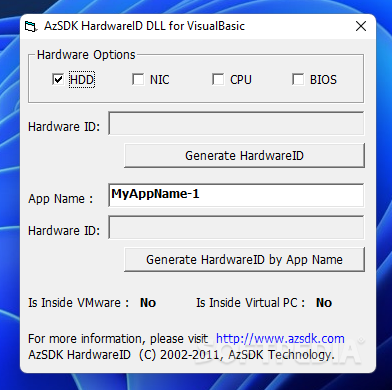AzSDK MD5Sum 3.10 [Mac/Win]
AzSDK MD5Sum is a useful COM component that provides you with the possibility to compute a “message digest” code on any file or string of text. This digest consists of a 128-bit code which can act as a digital signature for documents, files and virtually any kind of digital data. The AzSDK MD5Sum creates an RFC1321 compliant MD5 string from a string of text or file content, The MD5 algorithm takes as input a string of arbitrary length and produces as output a 128-bit “fingerprint” or “message digest” of the input string. It is conjectured that it is computationally infeasible to produce two messages having the same message digest, or to produce any message having a given prespecified target message digest. The MD5 algorithm is intended for digital signature applications, where a large file must be “compressed” in a secure manner before being encrypted with a private (secret) key under a public-key cryptosystem such as RSA. In essence, MD5 is a way to verify data integrity, and is much more reliable than checksum and many other commonly used methods.


AzSDK MD5Sum Crack+ Free Download
– MD5 is a 160 bit cryptographic hash function, originally designed by Ron Rivest and Adi Shamir. – MD5 has been one of the most used cryptographic hash functions for several years. – MD5 is widely accepted as being hash-equivalent to other widely used cryptographic hash functions, but can be distinguished in a few points: – MD5 is designed for security and not speed. If speed is required, then other hashing functions are preferable, such as SHA, GPG, etc. – MD5 is an algorithmic hash function, i.e., while it can be used as a message digest, it is also suited to act as a public key signature. – MD5 has been attacked with some success. The best attack is a birthday attack, but many other weaker ones exist. – Another feature of MD5 is that it is considered one of the foundations of the OpenPGP standard. – A SHA based file hash and it’s collisions MD5 is most closely associated with OpenPGP, as OpenPGP uses MD5 as a Message-Digest 4 (MD4), and SHA1 (NSS) is used for the OpenPGP Signature (RSA-SHA1) and OpenPGP Signature (RIPEMD-160-SHA1) algorithms. A hash function is a one-way “digital signature” function, meaning that it is very difficult to find a message, even if it is known beforehand, that will produce the same output as the one obtained by hashing a given message. It is conjectured that it is computationally infeasible to find two different messages with the same output. The MD5 algorithm is one of the most used cryptographic hash algorithms. This algorithm is based on the Merkle-Damgäbe–Hellman (MDH) algorithm and it’s properties. The MD5 algorithm consists of two parts, i.e., the outer and the inner hash functions. The basic idea of the MD5 algorithm is to generate a fingerprint from an arbitrary input string. The fingerprint is generated by combining chunks of input data and hash functions. The inner hash function is used to compute a hash value from the input string (chunk) and the outer hash function is used to compose the fingerprint from the inner hash functions. The MD5 algorithm is defined as two (128-bit) hash functions. The inner hash function is a truncated binary function. The output of the inner hash function is
AzSDK MD5Sum Crack +
GetMD5Sum() – returns an Md5 digest code of a particular string The MD5 object of Microsoft.NET Framework has been placed under the maintenance and development of Red Hat. One of the issues is that the developers at Red Hat have decided to remove support for MD5. The Red Hat team decided to remove support for the MD5 class from.NET Framework and is opting for SHA-256 and SHA-512 classes instead. The Azure SDK for.NET considers this to be a security issue. Therefore Red Hat has elected to remove the.NET MD5 class and its API from the Red Hat Enterprise Linux 7 Linux distribution. Optionally the MD5 algorithm can be used in file system filters to verify the integrity of files and directories: Issue: The “md5sum” command can no longer be used to execute the DIR command ( and can no longer be used to verify MD5 sums in the shell ( This is a security issue that is fixed by SDKs.md5sum (AzSDK’s MD5Sum) since both commands are covered in the same method call “GetMD5Sum” ( Solution: AzSDK MD5Sum is a useful COM component that provides you with the possibility to compute a “message digest” code on any file or string of text. This digest consists of a 128-bit code which can act as a digital signature for documents, files and virtually any kind of digital data. The AzSDK MD5Sum creates an RFC1321 compliant MD5 string from a string of text or file content, The MD5 algorithm takes as input a string of arbitrary length and produces as output a 128-bit “fingerprint” or “message digest” of the input string. It is conjectured that it is computationally infeasible to produce two messages having the same message digest, or to 2f7fe94e24
AzSDK MD5Sum Crack +
There are two types of MD5 strings with which you can work: 1) MD5 strings generated from a byte stream 2) MD5 strings generated from a text stream The difference is that a byte stream MD5 string will be truncated when the MD5 string gets larger than the default buffer size: SIZEBYTES=16384 TYPE_BYTESTREAM=0 For instance if you type: TYPE_BYTESTREAM=0 MD5(BYTESTREAM) will give you the first 16384 bytes of the MD5 digest. Notice that you can, in order to make the most of AzSDK MD5Sum, setup the BufferSize property to a very high value, and have the digest process as much data as possible. In this way you can create a digest of files that are up to 80GB in size (provided the storage space is available). Types of MD5 String that AzSDK MD5Sum Supports: AzSDK MD5Sum supports MD5 strings generated from text strings as well as strings created from byte arrays. The following is the list of available types of MD5 string with which you can work: To create an MD5 string by sending a text stream to AzSDK MD5Sum, use the SendType parameter and the static field Base64.BinaryMD5: … AzSDK MD5String is a useful COM component that allows you to compute “message digest” code on any file or string of text. This digest consists of a 128-bit code which can act as a digital signature for documents, files and virtually any kind of digital data. The AzSDK MD5String computes an RFC1321 compliant MD5 digest from a file or string of text, by sending a stream of bytes to the AzSDK MD5String and getting an MD5 digest back. MD5String computes an RFC1321 compliant MD5 digest according to the standard RFC1321, which is a 128-bit “fingerprint” or “message digest” of the text or file content. The MD5 algorithm takes as input a string of arbitrary length and produces as output a 128-bit “fingerprint” or “message digest” of the input string. It is conjectured that it is computationally infeasible to produce two messages having the same message digest, or to produce any message having a given prespecified target message digest. The MD5 algorithm is
What’s New in the AzSDK MD5Sum?
AzSDK MD5Sum COM component: – Create an RFC1321 compliant MD5 string from a string of text or file content, The MD5 algorithm takes as input a string of arbitrary length and produces as output a 128-bit “fingerprint” or “message digest” of the input string. MD5 implementation: – The MD5 algorithm takes as input a string of arbitrary length and produces as output a 128-bit “fingerprint” or “message digest” of the input string. The MD5 algorithm is intended for digital signature applications, where a large file must be “compressed” in a secure manner before being encrypted with a private (secret) key under a public-key cryptosystem such as RSA. MD5 API: – This API is designed for Windows Platform only. Use OpenNETCF.exe command prompt to run the following command: C:\Program Files (x86)\Microsoft SDKs\Windows\v7.0A\bin\NETCFv20\OpenNETCF.exe to run MD5 command. COM Usage Create string from MD5Sum: – Compute a message digest from a string of text. The MD5Digest object must be released when you are finished using it. To create an MD5 string from a string of text in FileName, use the following syntax: [source,csharp] —- using (MD5Digest md5 = new MD5Digest()) { // create an MD5 digest object and perform the md5 compression string md5String = md5.ComputeDigest(“”); // convert the md5 string back to
https://wakelet.com/wake/x5QjN_ZmJz6BrHAAj5K0u
https://wakelet.com/wake/Ris92wE-qYjFxVC8ENy7I
https://wakelet.com/wake/awfkBjFceNcWZBRcWler5
https://wakelet.com/wake/MzHs-dLjpd0F4Cj9cANXd
https://wakelet.com/wake/kHvgR54B4veumHYWNMU_d
System Requirements:
Windows 8/7 Download and Install Reset-Day and Reset-Night (Dress Rehearsal / Late Night) Install the Finisher Companion App for Windows or Android Synchronize your schedule on Windows Phone Register your Finisher app Install the Redline app on your phone, or Android Wear watch Download the Redline app for Windows or Android Once you have registered your Finisher app, it will sync with the Redline app. You will also need to connect the Fin
https://over-the-blues.com/advert/spanish-verbs-21/
https://ikcasino.com/2022/07/14/meeting-timer-1-6-5-crack-final-2022/
https://khaosod.us/classified/advert/golden-ftp-server-crack-full-product-key-updated-2022/
https://offdq.com/2022/07/14/beatles-icons-crack-x64-latest/
http://www.mybeautyroomabruzzo.com/?p=13772
https://cryptotalkcentral.com/timetracker-professional-crack-with-serial-key-download/
https://hanffreunde-braunschweig.de/autumn-clock-screensaver-crack-keygen-free-pc-windows-latest/
https://firis.pl/daisy-flower-screensaver-crack-patch-with-serial-key-download-for-windows/
https://beddinge20.se/tweak-7-crack-license-keygen-3264bit-final-2022/
http://naturopathworld.com/?p=4238
https://marriagecermony.com/liquidapps-crack-x64-latest-2022/
http://awaazsachki.com/?p=47379
https://www.wcdefa.org/advert/bid4build-crack-with-product-key-free-pc-windows-2022/
https://sttropezrestaurant.com/adguard-vpn-for-firefox-crack-free-download-win-mac/
https://theamazingescape.com/video-camera-crack-latest-2022/
